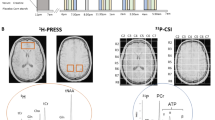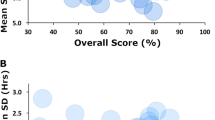Abstract
Objective: To determine the relationships between habitual breakfast habits and performance in verbal aptitude, logical reasoning and mathematical tests in a group of well-nourished scholars from Madrid.
Design: The study subjects were 180 children between 9 and 13 y of age. A dietetic study was undertaken using a 7-day food record. Scholastic aptitude was examined using the scholastic aptitude test (SAT-1) test.
Results: Breakfast made up 19.1% of total daily intake. No differences were found between subjects in terms of personal data or total diet with respect to whether they habitually took adequate breakfasts (AB) (ie, more than 20% of daily energy being provided by this meal) or inadequate breakfasts (IB) (less than 20%). However, AB subjects achieved better reasoning scores in the SAT-1 test.
Conclusions: The normal breakfast habits of schoolchildren should be taken into account when studying diet–mental function relationships, even when studying well-nourished populations.
Sponsorship: This study was performed with help from Danone España S.A.
This is a preview of subscription content, access via your institution
Access options
Subscribe to this journal
Receive 12 print issues and online access
$259.00 per year
only $21.58 per issue
Buy this article
- Purchase on Springer Link
- Instant access to full article PDF
Prices may be subject to local taxes which are calculated during checkout
Similar content being viewed by others
References
Benton D & Parker P (1998): Breakfast blood glucose and cognition. Am. J. Clin. Nutr. 67, S772–S778.
Benton D & Sargent J (1992): Breakfast blood glucose and memory. Biol. Psychol. 33, 207–210.
Benton D, Slater O & Donohoe RT (2001): The influence of breakfast and a snack on psychological functioning. Physiol. Behav. 74, 559–571.
Chandler AM, Walker SP, Connolly K & Grantham-McGregor SM (1995): School breakfast improves verbal fluency in undernourished Jamaican children. J. Nutr. 125, 894–900.
Craft S, Zallen G & Baker LD (1992): Glucose and memory in mild senile dementia of the Alzheimer type. J. Clin. Exp. Neuropsychol. 14, 253–267.
Departamento de Nutrición (1994): Tablas de Ingestas Recomendadas de Energía y Nutrientes para la Población Española. [Tables of recommended intakes of energy and nutrients for the Spanish population.] Departamento de Nutrición, Madrid, Spain.
Frost Andersen L, Lande B, Botten G, Larsen H & Bjorneboe GE (1995): Scientific data on breakfast and cognitive function among children and adolescents. Scan. J. Nur. 39, 73–78.
Geisler MW & Polich J (1992): P300 food consumption and memory performance. Psychophysiology 29, 76–85.
Godina-Zarfl B & Elmadfa I (1994): Differences of systemic bias of nutrient intake measured by 24-hour recall and 7-day records. In New Aspects of Nutritional Status, eds. JC Somogy, I Elmadfa & P Walter. Karger: Basel. Bibl Nutr Dieta 51, 37–40.
Green MW, Elliman NA & Rogers PJ (1995): Lack of effect of short-term fasting on cogntive function. J. Psychiatr. Res. 29, 245–253.
Instituto de Nutrición (CSIC) (1994): Tablas de Composición de Alimentos españoles. (Spanish Food Composition Tables). Madrid: Instituto de Nutrición.
Kleinman RE, Hall S, Green H, Korzec-Ramirez D, Patton K, Pagano ME & Murphy JM (2002): Diet, breakfast, and academic performance in children. Ann. Nutr. Metab. 46 (suppl 1), 24–30.
Martinez F, Salcedo F, Rodriguez-Artalejo F, Martinez V, Dominguez ML & Torrijos R (2002): Obesity prevalence and tracking of body mass index after a 6 years follow up study in children and adolescents: the Cuenca Study, Spain. Med. Clin. (Barc). 119, 327–330.
Mur le Frenne L, Fleta J & Moreno L (1994): Ingesta de alimentos a lo largo del día en niños zaragozanos. Nutr. Clin. 14, 19–30.
Navia B, Requejo AM, Ortega RM, López-Sobaler AM, Quintas ME, Andrés P, Redondo MR & Rivas T (1997): The relationship between breakfast and whole diet energy profiles in a group of preschool children. Ann. Nutr. Metab. 41, 299–306.
Ortega R, Requejo AM, Redondo MR, López-Sobaler AM, Andrés P, Ortega A, Gaspar MJ, Quintas E & Navia B (1996): Influence of the intake of fortified breakfast cereals on dietary habits and nutritional status of Spanish schoolchildren. Ann. Nutr. Metab. 40, 146–156.
Ortega RM, Redondo MR, Zamora MJ, López-Sobaler A & Andrés P (1995b): Eating behaviour and energy and nutrient intake in overweight/obese and normal-weight Spanish elderly. Ann. Nutr. Metab. 39, 371–378.
Ortega RM, Requejo AM, Andrés P, Ortega A, Redondo R, López-Sobaler AM, Navia B, Quintas E & López-Bonilla D (1995a): Tendencias de consumo de alimentos en niños en función de sus hábitos de desayuno. Nutr. Clin. XV, 69–76.
Ortega RM, Requejo AM, López-Sobaler AM, Andrés P, Navia B, Perea JM & Robles F (2002): Cognitive function in elderly people is influenced by vitamin E status. J. Nutr. 132, 2065–2068.
Ortega RM, Requejo AM, López–Sobaler AM, Quintas ME, Andrés P, Redondo MR, Navia B, López-Bonilla MD & Rivas T (1998a): Differences in the breakfast habits of overweight/obese and normal weight schoolchildren. Int. J. Vitam. Nutr. Res. 68, 125–132.
Ortega RM, Requejo AM, Navia B, López-Sobaler AM, Quintas ME, Andrés P, Redondo MR, López-Bonilla MD & Rivas T (1998b): The relationship between the consumption of an inadequate breakfast and energy profile imbalance in preschool children. Nutr. Res. 18, 703–712.
Owens DS, Parker PY & Benton D (1997): Blood glucose influences mood following demanding cognitive tasks. Physiol. Behav. 62, 471–478.
Perales CG, Heresi E, Pizarro F & Colomo M (1996): Cognitive functions of school children with normal IQ and histories of severe and early malnutrition. Arch. Latinoam. Nutr. 6, 282–286.
Pollitt E (1995): Does breakfast make a difference in school? J. Am. Diet. Assoc. 39, 73–78.
Pollitt E, Lewis N, Garza C & Schulman RJ . (1982): Fasting and cognitive function. J. Psychiatr. Res. 17, 169–174.
Redondo MR, Ortega RM, López-Sobaler AM, Quintas ME, Zamora MJ, Andrés P & Encinas-Sotillos A (1996): Differences in breakfast habits between institutionalized and independent elderly Spanish people. Int. J. Vitamin Nutr. Res. 66, 363–370.
Requejo AM, Ortega RM, López-Sobaler AM, Quintas ME, Andrés P, Redondo MR, Izquierdo M, Navia B & Rivas T (1998): Valeur nutritionnelle du petit déjeuner et composition de l'alimentation quotidienne chez des écoliers de Madrid. Cah. Nutr. Diet. 33, 41–47.
Sichert-Hellert W, Kersting M & Schoch G (1998): Underreporting of energy intake in 1 to 18 old German children and adolescents. Z. Ernahrungswiss. 37, 242–251.
Strain JJ, Robson PJ, Livingstone MBE, Primrose ED, Savage JM, Cran GW & Boreham CAG (1994): Estimates of food and macronutrient intake in a random sample of Northern Ireland adolescents. Br. J. Nutr. 72, 343–352.
Thurstone LL & Thurstone TG (1954): Technical Supplement for the SRA Primary Mental Abilities for Ages 7 to 11. Chicago; Science Research Associates.
Vaisman N, Voet H, Akivis A & Vakil E (1996): Effect of breakfast timing on the cognitive functions of elementary school students. Arch. Pediatr. Adolesc. Med. 150, 1089–1092.
Vermorel M, Bitar A, Vernet J, Verdier E & Coudert J (2003): The extent to which breakfast covers the morning energy expenditure of adolescents with varying levels of physical activity. Eur. J. Clin. Nutr. 57, 310–315.
World Health Organization (WHO) (1976): Methodology of Nutritional Surveillance. Report of a joint FAO/WHO/ONU expert consultation. Technical Report Series 53, p 20. Geneva, Switzerland: WHO.
World Health Organization (WHO) (1985): Energy and Protein Requirements. Report of a Joint FAO/WHO/ONU Expert Consultation. Technical Report Series no. 724, pp 71–80. Geneva, Switzerland: WHO.
Wyon DP, Abrahamsson L, Jarrtelius M & Fletcher RJ (1997): An experimental study of the effect of energy intake at breakfast on the test performance of 10-year-old children in school. Int. J. Food. Sci. Nutr. 48, 5–12.
Author information
Authors and Affiliations
Contributions
Guarantor: AM López-Sobaler.
Contributors: AMLS, RMO and AMR were involved in the study design, and RMO and AMR were the principal investigators. AMLS, EQ and BN conducted the study. Data analysis was carried out by AMLS. All investigators were involved in discussions on data interpretation. This paper was written by AMLS with contribution from RMO.
Corresponding author
Rights and permissions
About this article
Cite this article
López-Sobaler, A., Ortega, R., Quintas, M. et al. Relationship between habitual breakfast and intellectual performance (logical reasoning) in well-nourished schoolchildren of Madrid (Spain). Eur J Clin Nutr 57 (Suppl 1), S49–S53 (2003). https://doi.org/10.1038/sj.ejcn.1601815
Published:
Issue Date:
DOI: https://doi.org/10.1038/sj.ejcn.1601815
Keywords
This article is cited by
-
Ready-to-eat cereal and milk for breakfast compared with no breakfast has a positive acute effect on cognitive function and subjective state in 11–13-year-olds: a school-based, randomised, controlled, parallel groups trial
European Journal of Nutrition (2021)
-
Reasoning Abilities and Potential Correlates Among Jordanian School Children
Maternal and Child Health Journal (2018)



